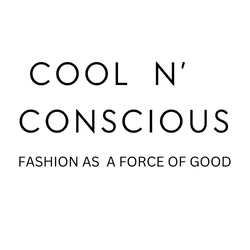8 things on how to make ethical choices and contribute to a more sustainable and stylish future.
-
Buy Less But Better: The first step towards sustainable fashion is to adopt a mindset of mindful consumption. Instead of succumbing to fast fashion's allure of endless trends and cheap prices, focus on buying fewer, high-quality pieces that will last. Invest in timeless designs that can be worn for multiple seasons, reducing the need for constant replacements and minimizing waste.
-
Invest in Sustainable and Ethical Fashion Brands: You can be cool and SAVE THE PLANET at the same time.Supporting sustainable fashion brands is a crucial way to make a positive impact. Seek out brands that prioritize ethical sourcing, fair labor practices, and environmentally friendly production methods. We have carefully selected some of the best ones in our curated eshop Cool and Conscious
-
Shop Second Hand and Vintage: Exploring second-hand and vintage options is not only environmentally friendly but also adds a unique touch to your style. Thrift stores, consignment shops, and online platforms offer a treasure trove of pre-loved fashion finds. By giving these items a new home, you extend their lifespan and reduce the demand for new production.
-
Avoid Greenwashing: Be wary of greenwashing, which is when companies misleadingly market their products as sustainable or eco-friendly. Look beyond marketing claims and dig deeper into a brand's practices and certifications. Educate yourself on what truly defines sustainability in fashion, enabling you to make informed choices that align with your values.
-
Know Your Materials: Understanding the materials used in your clothing is essential for making sustainable choices. Opt for natural fibers like organic cotton, linen, hemp, or TENCEL™, which have a lower environmental impact compared to synthetic materials. Consider the durability, recyclability, and biodegradability of materials to ensure your garments have a minimal ecological footprint.
-
Be Conscious About Vegan Fashion: Vegan fashion goes beyond avoiding animal products; it encompasses ethical considerations for the entire supply chain. Look for brands that prioritize cruelty-free practices, use alternative materials to leather and fur, and maintain transparent sourcing policies. Supporting vegan fashion promotes a compassionate approach to style and respects animal rights.
-
Ask, "Who Made My Clothes?": Promoting fair labor conditions is a vital aspect of sustainable fashion. By asking brands about their supply chains and ensuring ethical practices, you support the rights and well-being of garment workers. Look for brands that provide transparency and traceability, ensuring fair wages and safe working conditions throughout the production process. You can also sign at Goodclothesfairpay to push for legislation in EU that requires companies to conduct living wage due diligence in their supply chains, a campaign created by Fashion revolution org.
-
Take Care of Your Clothes: Caring for your garments plays a vital role in sustainable fashion. Follow the care instructions provided by the manufacturer to ensure longevity and prevent unnecessary wear and tear. Adopt eco-friendly laundry practices by washing your clothes in cold water, using environmentally friendly detergents, and air-drying whenever possible. Repair minor damages, such as loose buttons or small tears, to extend the lifespan of your clothes. By treating your clothes with care, you not only reduce waste but also preserve their quality and ensure they continue to bring joy to your wardrobe for years to come.
Let's celebrate fashion with a purpose and make choices that empower both people and the planet!

